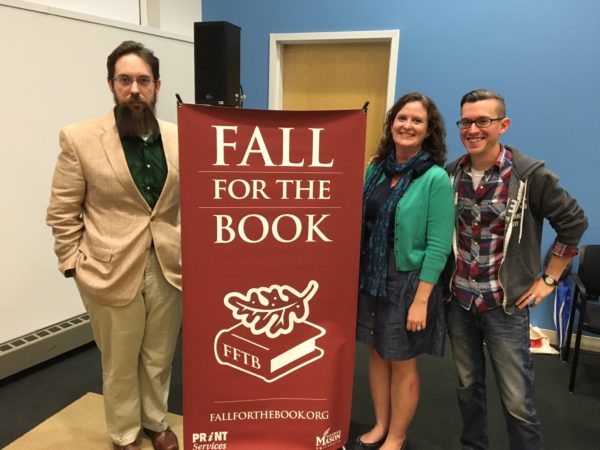What is it about Fall for the Book that makes me sad every single year? I’ve been asking myself this question all week.
I love this literary festival, held every year on George Mason University’s campus. I “grew up with it” in some ways, having attended it since my very first year in the MFA program there. I’ve seen and met amazing writers each year and had great experiences presenting at it myself.
But every year I get this hollowness in my chest. Every year I get the Fall for the Book blues, and when it hits, it hits big.
It hit last week, after I presented on a publishing panel for Santa Fe Writers Project. The panel itself went well. We had a small audience, which was probably in part due to timing and bad weather, but they were engaged and interested. We even sold a few books.
But later that night, I started to get the sadness. Those feelings of inadequacy, of hopelessness.
Maybe it’s tied to the fact that I “grew up with it,” that the nostalgia of the festival brings out some deep-seated anxieties or at least highlights them in a different way. When I was first attending FFTB, I was an unpublished writer desperately wanting to be a published writer. I listened to accomplished authors with their amazing books and felt like I would never get there. I remember attending a panel of Mason MFA alumni and thinking, ‘Wow, they went through this same program and now they have books and a career. Will this ever happen to me?” It was panic-attack-inducing at the same time that it was inspiring.
It got worse after I graduated from the program and started to see my own classmates and writer friends get published. I’d attend their Fall for the Book events and though I was ecstatic to see them succeed and be awesome, that same inadequacy for myself started creeping in. Will I ever get there?
And then I started publishing things, but never in The New Yorker. And then my first book came out, but it was “just with a small press.” And then I won an award, but it wasn’t a Pushcart. And it goes on. Will I ever get There?
What I’ve come to realize—even though I have to continue to tell myself this over and over and over again—is that the truth is, there is no “There” to get to. Each new level of success we reach or accomplishment we earn opens a whole other world of challenges to conquer, a whole other set of demons and confusions and expectations to navigate. And you can drive yourself crazy battling them.
I think it’s a universal feeling to always feel that wherever you are is not good enough. Especially for writers, perspectives, goals, and aspirations shift as we move forward. I think about myself twelve years ago, and how I would’ve gladly stuck my tongue out and gotten it run over by a tractor trailer to have a book published. I think about Merritt Tierce’s recent piece in Marie Claire about book sales and not being able to live off her writing. She’s been scorned by some people, but I have to say I kind of get it. The higher you get on the publishing ladder, the farther it feels you can fall. The inadequacy feels even more looming—”Well, surely, if I was able to do this, it can’t really mean all that much.”
I’m not trying to get all woe-is-me on you. I feel very fortunate that I’m able to continue writing and have success doing so. I’m grateful to all the wonderful writers and editors that I’ve met and built friendships with who keep me going every day. I’m proud of all the hard work that both my husband and I put in to our writing and editing, and totally fine with the sacrifices we make to continue doing this insanity.
But despite all that, my own worst inner critic never goes away. And sometimes I think it’s important to acknowledge that beast. To yank it out and stare at it and say, “Ok, fine. I get you. I’m not perfect and sometimes I feel sucky.” And then put it away, and crank up your computer and get back to work.
After the panel last week I had a young woman come up to talk to me. She was excited. She said she’d never heard of flash fiction until that night, and she’d been writing all these one or two page stories and not having a clue what to do with them. She thanked me for mentioning it and we talked for a bit about all the amazing journals out there that want those very stories.
And you know what? That was enough. That was worth it. That is why I keep doing what I do, year after year, even when the demons get me down.

